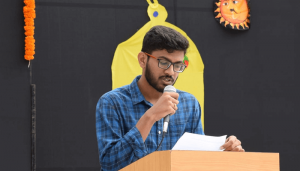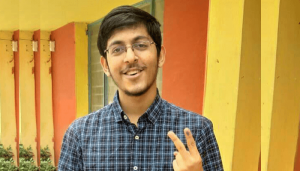It was for better governance and to get students’ perspective of policies and regulations at the International Institute of Information Technology Hyderabad that the first Student Parliament was set up in 2001. A lot has changed since then – from membership by nomination to elections. This week, as the student community gears up to cast its virtual ballot, we take a look at how this little army is enlisted and the issues they tackle.
When the academic course load of students at the International Institute of Information Technology Hyderabad (IIITH) was eased in November 2020, they had their elected representatives to thank. An internal survey conducted by the student body (titled Student Parliament) had revealed that 82% of the students felt overwhelmed due to online academic stress. These findings when presented to the Academic Staff Committee resulted in a reduced course duration as well as syllabus. “The major work done by the Parliament is having student representation to college authorities,” says Ankit Pant, former General Secretary of the 2019-2020 SP. In fact he labels all the activities that come under its ambit as student ‘voluntary services’ and says that the body serves as a 2-way channel. ”We try to be a communication layer between the students and the management. We do this by not only bringing in student perspectives while taking part in decision making processes of the institute that affect us but also try to help in enforcing rules and guidelines that have been laid out.”
Early Beginnings
It was in 2001 that the Student Life Committee (SLC) was officially established with Prof. Jayanthi Sivaswamy as its chairperson. It continues to be the official body responsible for conducting all activities such as clubs and cultural events related to student life. “The idea of having a Student Parliament was mooted for governance and we had 50 members in the very first parliament representing or in-charge of different areas,” says Prof. Sivaswamy, adding that initially the areas were broad such as Sports, Placements, Cultural, Mess and Canteen, Labs and Library, and Planning and Management. “These areas were completely determined by the students. Membership was by nomination in the initial years and later by election,” she says.
Structure and Composition
The Student Parliament consists of students vidalista 40 who represent each batch in the institute. Typically, there’s one representative for every 50 students in a batch, more popularly known as a constituency. These representatives are elected each year through secret ballot by means of Single Transferable Vote. The representatives then go on to elect the General Secretary and the Speaker. As someone who has played both the roles of Speaker (in 2019-2020) as well as that of the current Interim General Secretary, Sunil Anumolu says, “The relation between General Secretary and Speaker sets the tone of the Parliament and the two of them are the main pillars of the Parliament. When the General Secretary is away, the Speaker takes control of things assumes responsibility.” It is the General Secretary (often with the advice of the Speaker) who nominates some representatives from the members to act as Secretaries (like the Hostel Secretary, Mess Secretary, etc.). The elected representatives then meet once every week or fortnight and hold discussions pertaining to a myriad of student issues. The Speaker’s role is very similar to that witnessed in the Indian Parliament – maintaining decorum, calling for meetings on a regular basis to discuss various student and general issues, handling documentation, and coordination of all activities within the Parliament.

How They Work
The process followed is rather simple. “If there’s any issue faced by students in any batch, the concerned representatives bring it to the notice of the Speaker and General Secretary. We discuss those issues and deliberate on how to solve them. If needed, we also meet the concerned faculty members to resolve those issues. For instance, if it concerns the mess system, only those in the Mess Committee from the Parliament will meet with concerned faculty members. It’s the same with other committees too. If there are any issues that we are unable to resolve, then we enlist the help of some faculty members, especially the SLC Chair,” explains Sunil.
Issues Tackled
For an overview of the kind of activities and initiatives undertaken by the student body, one needs to look no further than its Annual Report that is traditionally presented during the Independence Day address to students. The academic year 2019-2020 was a busy and challenging one owing in large measure to the onset of the pandemic and subsequent nation-wide lockdown. In the months preceding the pandemic, the student body worked on a variety of issues ranging from those associated with the hostel, such as replacement of worn-out washing machines, the application of anti-skid strips on staricases of various hostels to avert accidents during the Monsoon season, dealing with mosquitoes and vermin by increasing the frequency of fogging around hostels, to other student life issues such as participation in the green campus initiatives by supporting a gradual ban of single-use plastic on campus, and the creation of a gender-neutral common space in hostels to permit cross-entry of the sexes. The task of vacating the hostels by graduating students proved to be a unique challenge primarily due to the fact that the students were physically not present, having left when the institute announced a closure in March 2020. “Instead of asking everybody to come in and vacate in June-July, which was frankly not possible, we provided multiple options – asking relatives to come in and help wind up, asking movers and packers to do it on students’ behalf and so on. I was in constant communication with hostel wardens, and the Chair CoW (Committee of Wardens). We exchanged a lot of emails and held a lot of meetings. It was challenging but successful,” smiles Ankit.
Online Elections
With everything chugging along in an online mode, a decision was undertaken to conduct elections for representatives to the Student Parliament too virtually. In order to make sure it was conducted in a fair manner and to prevent rigging of any sort, the election portal was merged into the Integrated Management System (IMS) with the help of the Institute IT team. “It was a complicated process and hence took a while to do this. While elections for the Felicity committee have been conducted, those for the Student Parliament will now happen in the next week. For this, students have had to submit their nominations, and manifestos too online,” says Sunil.
Motivating Others
An orientation detailing various activities that exist on campus is the first step towards inculcating awareness among freshers. Ankit Pant, who was the institute’s first PG General Secretary of the Student Parliament and recipient of the Outstanding Volunteer Award 2020, says, ”When they told our batch about the work involved, I was motivated to try and join the Parliament. I feel that howsoever small it may be, we do make a difference. It goes a long way in ensuring that student life is smooth and they spend happy years on campus minus problems”. Shivaan Sehgal, Interim Speaker, who has been a part of the Student Parliament since his freshman year would like to see many more of the likes of Ankit. ”Besides excelling academically, I hope others will be motivated and come forward to contribute selflessly towards this community,” he says.



